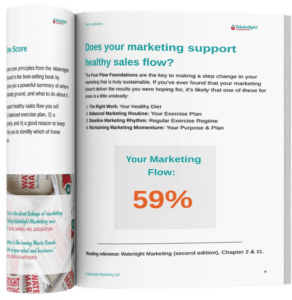Your first 100 days in a head of marketing role is challenging, nerve-wracking, exciting, important. I have set up, developed or inherited several marketing and business development teams in my time. If you are in a similar position, then here are some ideas from 25 years’ of experience to help you get the marketing essentials right.
1. Get to know your team.
Find out about their motivations, roles, where they would like to develop, any skills gaps, what they feel works well, what they feel doesn’t, frustrations, recent successes, and so on. This knowledge is fundamental. At some point soon you’ll need to both set out your stall for how you want to shape the team and get them alongside you to help make it happen. Remember that your team includes your regular suppliers.
2. Have meetings with heads of business units or other key people in the business.
Typically these are the people with whom your team will be working to support them in growing the business and one of the first things you’ll need to do is build your knowledge of the business, their marketplace, opportunities, targets, competitors, influencers, regulators, plans, activities, preoccupations, challenges and drivers.
3. Speak to your counterparts.
These are: people heading up sales, finance, IT and HR. In its operation, marketing has – or should have – a lot to do with sales, finance, IT and HR so best to have good collaborative working relationships with these departments.
4. Find out more from employees.
Some of them, or all of them if the business is small enough! Ask about their day to day work, their role, how they work, what their customers say (good and bad), their view of how to improve, what works really well, what customers like.
5. Make sure plans are in place.
If not already in place, you’ll need a route map for where the business wants to go. Understand the company’s vision and strategy first so that you can get behind it and link your plans to this. Once you have a business plan, then you can put together a sales and marketing strategy and tactical plan. If one or both exist, review them. Both the business and marketing plans might be excellent, so don’t change just for change sake or because you feel you need to prove something in a new job.
6. Review your budget.
And make sure you get a good understanding and control of it. Identify any ‘quick wins’ where it looks as if money is leaking out and you could cut back without any impact on the company. (Running a Touchpoint Leak audit would be an excellent start!)
7. Use processes and technology to make your life easier.
These can include: CRM systems, guidelines, ways of working, templates, reporting software, e-marketing tools, protocols, regular meetings, anything which will take the burden out of what you and the team do. This will ‘release’ time and resource to enable your team to deliver a more bespoke service.
8. Agree with the team “standards of service” and how you deliver excellence.
My experience has been that marketing teams can be criticised for not delivering, not demonstrating return on investment, not producing qualified leads, and so on. So agreeing standards of services and speaking to team leaders about what these are can do wonders for motivation.
9. Find out who the company’s key clients are.
And if there is a plan to manage, protect and develop those clients. If not, consider how to set up and run a key client management programme and who it would be good to get involved. Arrange to meet those clients.
10. Ask, listen, learn, build relationships.
That’s what this first 100 days is about. You’ll be finding out what the politics are, but stand back from this – now is not the time. However, do share your approach and beliefs around marketing and sales. And, by the end of that time, do have some plans and proposals that you can share about how you’d like to shape the marketing team in the future.
A longer version of this can be found here.
© Rachael Wheatley – Bluegreen Learning. This article originally appeared here.
By Rachael Wheatley – Watertight Marketing Certified Practitioner. Rachael is a strategic marketing consultant with over 20 years of experience, with a focus on integrated marketing and sales for sustainable results. See Rachael’s full profile
Questions? Drop me a line on Twitter: @bluegreenlearn


